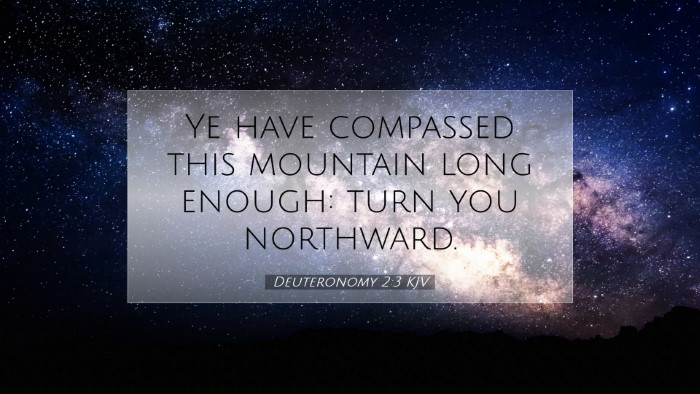Commentary on Deuteronomy 2:3
Bible Verse: "You have circled this mountain long enough. Now turn north." (Deuteronomy 2:3, NASB)
Introduction
This verse comes at a crucial juncture in the journey of the Israelites, signifying both a physical and spiritual crossroads. Here, God addresses His people after a long period of wandering, urging them to move forward into their promised destiny. The insights gathered from various public domain commentaries shed light on its significance for both the contemporaneous audience and modern readers, particularly pastors, students, theologians, and Bible scholars.
Contextual Background
In the book of Deuteronomy, Moses recounts the laws and events that shaped Israel's identity and relationship with God. Chapter 2 recounts their wanderings through the wilderness, specifically the prolonged stay around Mount Seir. This recurring cycle of circling reflects not just a physical journey but a metaphor for spiritual stagnation.
Theological Insights
1. A Divine Call to Move Forward
As highlighted by Matthew Henry, God’s instruction to "turn north" serves as a clarion call for progress. The phrase "circled this mountain long enough" signifies God's patience as well as the necessity for His people to advance. There are times in our lives when God calls us away from complacency toward a greater purpose, echoing the call to move beyond the familiar towards the unknown that He has promised.
2. Recognizing the Seasons of Life
Albert Barnes emphasizes the importance of seasons in life and the need for discernment when God signals a time for change. Just as Israel was stuck in a cycle of wandering, believers today can find themselves in spiritual ruts. This passage encourages self-awareness and recognition of when it’s time to change direction based on God’s leading.
3. The Importance of Obedience
In his commentary, Adam Clarke stresses obedience to God’s directives. The decision to “turn north” was not merely a geographical command but a spiritual mandate necessitating faith. The Israelites were called to trust in God’s guidance despite prior failures or fears about what lay ahead. For today’s readers, this reflects the call to a life of faith wherein God’s guidance must be followed even without all the answers.
4. The Symbolism of Mountains
Mountains often symbolize challenges, obstacles, or significant experiences in the Biblical narrative. As Henry notes, staying too long around this particular mountain can signify the burdens and strongholds that hinder spiritual progress. Thus, the directive to turn and move north can also be seen as an invitation to overcome those barriers and pursue the pathway God has laid out for His people.
Practical Applications
1. Discern Personal Mountain Circles
Just as the Israelites were reminded of their wandering, pastors and theologians should encourage congregations to identify personal mountains that may be hindering spiritual growth. Reflection and prayer can help in discovering areas where one may have lingered too long without spiritual progression.
2. Embrace New Directions
Encourage a communal spirit that invites members to share their journeys of faith. Community discussions about ‘turning north’ can lead to collective discernment and discerned faith actions. What does it mean for your church to move in a new direction under God’s call?
3. Trusting God’s Promises
All authors agree that moving north involves trusting in God’s promises. Highlighting testimonies of faith can serve as a powerful reminder of God's faithfulness. This builds a culture of expectancy and openness to the path that God is opening for the faithful.
Historical Context
This guidance came at a time when Israel was poised to enter the Promised Land but had been delayed due to previous disobedience and lack of faith. Understanding their historical context enhances the depth of the message relayed in Deuteronomy 2:3. They were reminded that wandering was not God’s ultimate plan; His desires for them were in the land filled with blessings yet to be fully realized.
Conclusion
Deuteronomy 2:3 serves as a powerful reminder that stagnant spiritual lives can lead to unfulfilled potential. Historical insights and theological reflections from commentaries by Matthew Henry, Albert Barnes, and Adam Clarke reveal that God desires an active engagement with His people. The journey is not over; it is a call to action, requiring individuals and communities alike to rise, turn, and face the new horizons that await when they step out in faith. Living out this principle means continuously seeking God’s direction, courageously facing new challenges, and moving energetically toward His promises.


